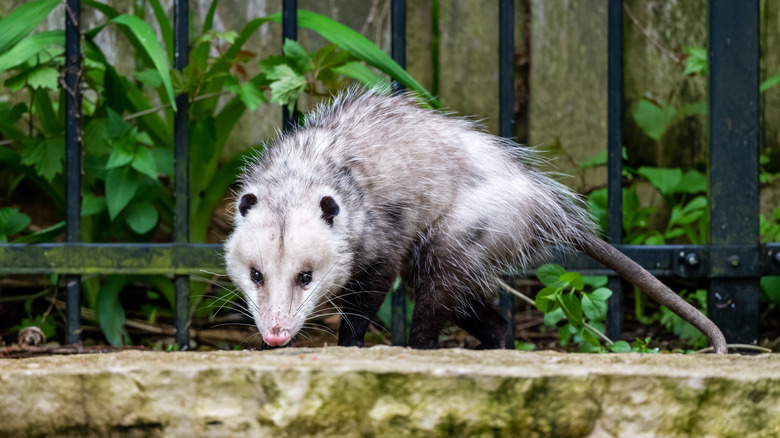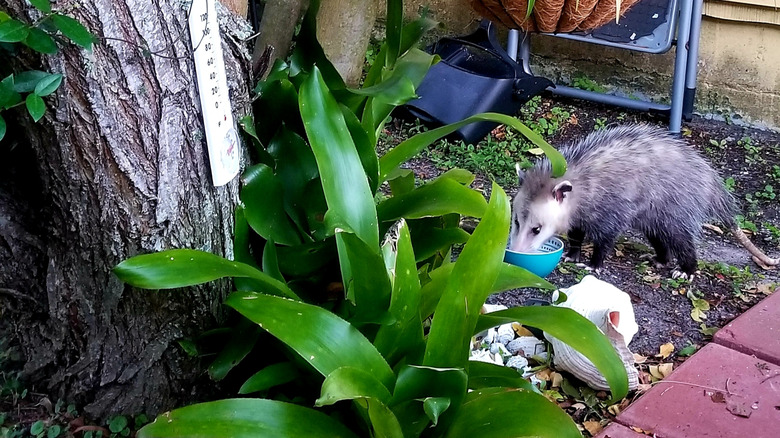Opossum Problem? Think Twice Before Using This Pesticide To Get Rid Of Them
Dealing with opossums in your yard can be a real headache. You might have stumbled upon numerous online suggestions recommending mothballs as a quick fix. But, this isn't the best idea. Review the facts before you go down that route. It's a common misconception that the scent of mothballs is an effective wildlife repellent. In reality, this smell does not significantly deter opossums or other animals. Moreover, the use of mothballs as a repellent is not just ineffective; it's harmful to the environment and potentially dangerous to your health. Mothballs contain naphthalene, a chemical known for its strong odor.
Naphthalene poses serious environmental concerns. When used outdoors, it can seep into the soil, contaminating it and potentially leaching into water sources. This contamination harms not just the soil's health but also the plants and wildlife that depend on it. Additionally, runoff water can carry naphthalene into streams, rivers, and ponds, affecting aquatic life. The health risks associated with naphthalene are equally alarming. A 2021 study in the journal Environmental Health Perspectives linked naphthalene exposure to an increased risk of cancer. This revelation underlines the importance of avoiding such chemicals, especially in a home garden setting where you, your family, and pets spend time.
Given these risks, it's crucial to explore nonchemical ways to deter opossums. A better approach is to make your yard less inviting to these creatures. This involves understanding and addressing what attracts opossums to your yard in the first place. Also, understanding their breeding and hiding preferences can help you make your space less appealing.
Eliminating food sources and hiding spots
Opossums are not picky eaters; they're attracted to a variety of food items that might be readily available in your yard. This includes fruits, vegetables, insects, small rodents, and, unfortunately, your garbage. Your first move should be to secure your trash cans with tight-fitting lids to reduce the allure of your yard. Also, if you have a habit of leaving pet food outside, you should reconsider. Feeding pets indoors or removing leftover food promptly can deter opossums, who might otherwise see your pet's food bowl as an open invitation. Also, if you have a garden, try to regularly pick up any fallen fruits or vegetables. These can be a feast for opossums, so keeping your garden tidy is key.
Opossums also look for cozy spots to hide and breed. They favor dark, secluded areas like brush piles and abandoned burrows. Regularly inspect these areas and close off any potential access points. This could involve sealing gaps under your deck or shed, clearing brush piles, and trimming back overgrown vegetation. By removing these hiding spots, you make your yard less attractive for opossums looking for a home. Lastly, try to understand their breeding habits. Opossums typically breed one to three times a year. During this period, they seek out safe, hidden spots for shelter. Reducing these opportunities in your yard makes it less conducive for opossums to raise their young.
Exploring alternative deterrent methods
So, you've tackled food sources and hiding spots, but opossums are still frequenting your yard? It's time to explore some alternative deterrent methods. These are humane and natural ways to keep opossums at bay without resorting to harmful chemicals. One such method is using motion-activated sprinklers. These devices can startle and deter opossums without causing them any harm. The sudden spray of water is often enough to scare away the nocturnal creatures and discourage them from returning. This method is especially useful for protecting specific areas like gardens or entryways.
Setting traps can be an option, too, but it requires more care. If you choose to use traps, make sure they are humane live traps. Check them regularly to ensure that any trapped animal is not suffering. Keep in mind that in some areas, relocating wildlife is regulated or even prohibited, so it's essential to familiarize yourself with local laws and regulations before trapping and relocating any opossums.
In addition to these methods, you can also consider installing fencing around your property. A sturdy fence that curves outward at the top and extends underground by at least 3 feet can prevent opossums from digging their way in. Similarly, using an electric or woven wire fence at least 4 feet high can stop them from climbing over. Or, use a combination of fencing for maximum effect. Remember, the goal of these methods is to deter opossums, not harm them. Opossums control insect and rodent populations, playing a beneficial role in our ecosystem.


